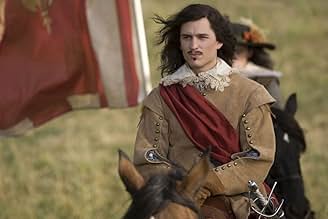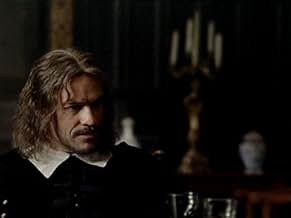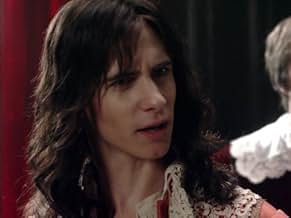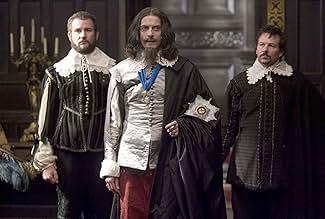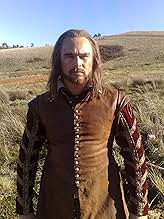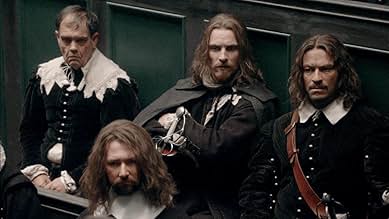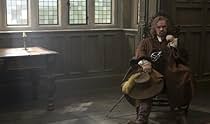The Devil's Whore
- Mini serie TV
- 2008
- 47min
VALUTAZIONE IMDb
7,0/10
2848
LA TUA VALUTAZIONE
Aggiungi una trama nella tua linguaDrama charts the progress of the English Civil War through the story of a young woman, the fictional Angelica Fanshawe, and her three husbands.Drama charts the progress of the English Civil War through the story of a young woman, the fictional Angelica Fanshawe, and her three husbands.Drama charts the progress of the English Civil War through the story of a young woman, the fictional Angelica Fanshawe, and her three husbands.
- Ha vinto 1 BAFTA Award
- 8 vittorie e 7 candidature totali
Sfoglia gli episodi
Recensioni in evidenza
Excellently entertaining series with some interesting slants on the history but I appreciate that the writers did not set out to create a drama-documentary. Although they did incorporate some historical accuracy, anyone not knowing the real history of the Civil War could/would be very confused by some of the content. The real Thomas Rainsborough did not marry someone called Angelica Fanshawe and he is buried in the now disappeared graveyard of St John's, Wapping.
Pity that IMD have posted a picture of John Simm/Sexby's stand-in rather than JS/Sexby himself!!!!!
I am also totally stunned that the makers of the series insisted that they could not find suitable filming locations in the UK. I could have suggested any number of suitable locations both privately owned (but the owners have allowed filming) and NT or English Heritage. It seems amazing that with so much Tudor and Jacobean property here, not to mention forests etc that they deemed it necessary to ship cast and crew several thousand miles away to South Africa.
Pity that IMD have posted a picture of John Simm/Sexby's stand-in rather than JS/Sexby himself!!!!!
I am also totally stunned that the makers of the series insisted that they could not find suitable filming locations in the UK. I could have suggested any number of suitable locations both privately owned (but the owners have allowed filming) and NT or English Heritage. It seems amazing that with so much Tudor and Jacobean property here, not to mention forests etc that they deemed it necessary to ship cast and crew several thousand miles away to South Africa.
I have little knowledge of the historical period on which this is based but it gave a pretty good idea of the socio political situation. All the actors were excellent and Michael Fassbender as Thomas Rainsborough was exceptional.
Peter Flannery wrote one of the finest dramatic accounts of recent history, the epic television series 'Our Friends in the North', but sadly, his attempt to write about the English Civil War is a far inferior affair. To me, the essence of good historical drama is that it distances us from our own times, and allows us to see how others could have held positions that seem to us indefensible; but 'The Devil's Whore' invents a fictitious female heroine, beautiful and anachronistically feisty (and involved in a story line that could have been borrowed from 'Thelma and Lousie'!) who seems to exist for the sole purpose of allowing us to judge the past through a modern pair of eyes. The writer also clearly wanted a share of the market for posh-frock romances, and the possibility of a happy end, while also putting this unlikely figure on the "right" side of the conflict - hence, wholly implausibly, our heroine is rendered as an aristocratic Leveller. The drama's general sympathy for the Levellers (and associated proto-socialist movements) is also overdone, in that the characters with attractive politics are consistently shows to be morally superior, and more likable, than those without. Against, the contrast with 'Our Friends', whose general sympathies for the Labour cause did not reduce the story to a black and white tale, is clear. The only really interesting character in this story is the Charles I, knowledge of whose execution perhaps invokes a certain involuntary sympathy on the part of the viewer, and who is suavely played by Peter Capaldi. But overall, 'The Devils Whore' is part Hollywood narrative , part Jane Austen and a sprinkling of socialism: an odd combination, and a disappointment compared with Flannery's best.
THE DEVIL'S MISTRESS (The Devil's Wh*re) (2008) was a pretty interesting series, that immediately drew me in with promises to learn more of the mysteries of the English Civil War (1636 - 1660) though it didn't necessarily live up to the high expectations it set in that regard, it was however, studded with a cast of stars, who all played their parts marvelously, flaws or not and offered insights into the era's turbulence, as well as political, social, moral, religious and sexual politics of the day, if not beheld from a modern eye.
It follows Angelica Fanshawe (Andrea Riseborough), a young "modern-minded" woman who sees strange visions of the devil, as the country is about to be torn in half with the impending civil war. She is torn between her Aristocratic Catholic identity and between her rising beliefs in the Rebel Leveller cause, rising up against the dated Monarchal/Aristocratic systems.
The cast was exceptional. Andrea Riseborough, John Simm, Michael Fassbender, Dominic West, Peter Capaldi, Tom Goodman-Hill, and Maxine Peake were all very memorable in their roles which made this series worth while. My favorite acted were John Simm (as the Edward Sexby), Peter Capaldi (as King Charles I), Michael Fassbender (as Thomas Rainsborough) and Andrea Riseborough (as Angelica Fanshawe).
Overall, it was an intriguing yet somewhat melodramatic show, with a few shining exceptions. The character of Angelica was of a love-hate for me, giving me very mixed emotions. Sometimes she felt strong and wise, and other times she seemed whiney and naive. Also, the series tried to imply she loved "men of ideas", but more often than not it seemed her "loves" were "lust at first sight" variety and not very deep at all. I was however, a fan of the tragic, scarred, grey colored, and somewhat cruel character of Edward Sexby (John Simm). He made for an interesting anti-hero, a man that you both fear and root for. His character is one you can deeply brood over, impossibly sad, hopeless and yet inspiring. You want him to find redemption and love, but he walks a tragic path indeed. The pair have an unspeakable chemistry and unique bond, making it impossibly difficult to look away when either / both are on screen. Highly effective technique.
The series was really moving and memorable, highlighting historical events and showcasing the darkers sides of human natures, but too often lowered itself into scenes of melodrama and gratuitous titilation, rather than focusing on the characters development and factual historical events, and the few historical events shown seemed lightly brushed over and not given the time desserved. Perhaps this was due to lower budget or time contraints or both? This series would have been so much greater if given more time and episodes. But still overall, a highly enjoyable series of two tragic figures living through a horrible war and torn country, with divided morals and questionable loyalties, that lingers on in the mind.
It follows Angelica Fanshawe (Andrea Riseborough), a young "modern-minded" woman who sees strange visions of the devil, as the country is about to be torn in half with the impending civil war. She is torn between her Aristocratic Catholic identity and between her rising beliefs in the Rebel Leveller cause, rising up against the dated Monarchal/Aristocratic systems.
The cast was exceptional. Andrea Riseborough, John Simm, Michael Fassbender, Dominic West, Peter Capaldi, Tom Goodman-Hill, and Maxine Peake were all very memorable in their roles which made this series worth while. My favorite acted were John Simm (as the Edward Sexby), Peter Capaldi (as King Charles I), Michael Fassbender (as Thomas Rainsborough) and Andrea Riseborough (as Angelica Fanshawe).
Overall, it was an intriguing yet somewhat melodramatic show, with a few shining exceptions. The character of Angelica was of a love-hate for me, giving me very mixed emotions. Sometimes she felt strong and wise, and other times she seemed whiney and naive. Also, the series tried to imply she loved "men of ideas", but more often than not it seemed her "loves" were "lust at first sight" variety and not very deep at all. I was however, a fan of the tragic, scarred, grey colored, and somewhat cruel character of Edward Sexby (John Simm). He made for an interesting anti-hero, a man that you both fear and root for. His character is one you can deeply brood over, impossibly sad, hopeless and yet inspiring. You want him to find redemption and love, but he walks a tragic path indeed. The pair have an unspeakable chemistry and unique bond, making it impossibly difficult to look away when either / both are on screen. Highly effective technique.
The series was really moving and memorable, highlighting historical events and showcasing the darkers sides of human natures, but too often lowered itself into scenes of melodrama and gratuitous titilation, rather than focusing on the characters development and factual historical events, and the few historical events shown seemed lightly brushed over and not given the time desserved. Perhaps this was due to lower budget or time contraints or both? This series would have been so much greater if given more time and episodes. But still overall, a highly enjoyable series of two tragic figures living through a horrible war and torn country, with divided morals and questionable loyalties, that lingers on in the mind.
Well, The Devil's Whore gets two cheers for trying – OK, make that two and a half - and if in some ways it failed, I don't think it should get all the blame. It seems that what was conceived of a 12-part series hit the financial buffers of necessity became a four-part series and, unfortunately, in many ways it shows. What finally hit the screens over four one-hour episodes is by no means bad and is most certainly very entertaining, but it is something of a mongrel, a hotch-potch of this, that and t'other. The background - well, more than the background - the whole context to what purports to be a true account of a fictional character is a period in British history which is not only fascinating but which led to the foundation of democracy throughout the world. But it was anything but straightforward: it wasn't simply a question of 'the people' rising up against 'the king' as many believe, but an intricate and complex realignment of authority and power. It began in the reign of Charles I and more or less concluded when his son, Charles II, was restored to the throne and England and Scotland once again had a monarchy. But it was a very different monarchy which now existed and over the next 150 led to the creation of parliament which Brtitain likes to boast was the template of all other parliaments. (It wasn't really, but that is here not the issue). But for a very nasty period of 20 years, Britain was convulsed by strife and civil war in which many died and which saw a great deal of death and brutality. In the Levellers, the country experienced what would later be known as communism but it also saw how privilege and property is so engrained in the fabric of this and all other countries that it takes more than ideals and violence to dislodge them. That is the background, and a 12-part series from the same team which produce this cutdown lite version might well have made a good fist of explaining the complexities of that time. In the event they don't, and what we do get at the historical and political level is akin to a primary school textbook account. The Devil's Whore is also something of a bodice-ripper, and here it perhaps scores a little more. And I suspect that element, the romance and dashing hero stuff would have found a way of fitting in quite nicely with an intelligent exposition of the English Civil War and its aftermath. The problem is that those who see The Devil's Whore might well remember that as their 'history', but it does take enormous liberties with the truth in the interests of creating rattling entertainment. Thus Thomas Rainsborough, Edward Sexby, John Lilburne and, of course, Oliver Cromwell were all historical characters, but in this version they are fictionalised to such an extent that often only their names remain what is true about them. There is also the quibble, a pretty universal fault, of coincidence: blow me do the various characters appear in just the right spot at just the right time. Right on cue. And they manage to travel some distances with no bother at all. Then there's the curious matter of the Devil, who appears, usually sitting on a tree, at the strangest moments. I assume he is the Devil for whom the heroine Angelica Fanshawe is the 'whore', but that must remained supposition as no explanation for his continued appearance is even attempted. And what about Prince Rupert, bosom pal of Angelica's first husband who even turns up in the wedding chamber on her wedding night, but then suddenly disappears from view never to be heard, seen or spoken of again. Odd. That, too, was probably a victim of the cuts from a 12-parter to a third that length. No doubt such anomalies might have been ironed out had the money been there and the series been a 12-parter after all. As it is we have to put up with outrageous suspension of disbelief. Overall, of course, and sitting side by side with other TV drama, The Devil's Whore isn't half bad and most certainly very entertaining. The pity is that for want of a penny or two more it might well have been outstanding. But that it isn't.
Lo sapevi?
- QuizMark Gatiss had a interview for the role of John Thurloe.
- ConnessioniVersion of Nuovi mondi (2014)
I più visti
Accedi per valutare e creare un elenco di titoli salvati per ottenere consigli personalizzati
- How many seasons does The Devil's Mistress have?Powered by Alexa
Dettagli
- Data di uscita
- Paesi di origine
- Sito ufficiale
- Lingua
- Celebre anche come
- The Devil's Mistress
- Luoghi delle riprese
- Aziende produttrici
- Vedi altri crediti dell’azienda su IMDbPro
Contribuisci a questa pagina
Suggerisci una modifica o aggiungi i contenuti mancanti

